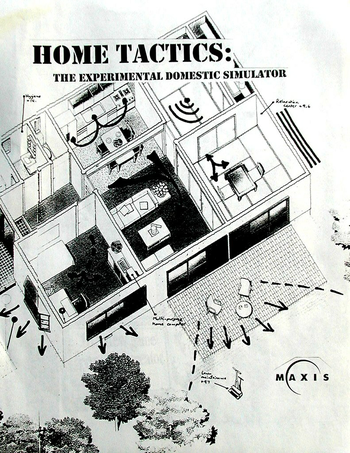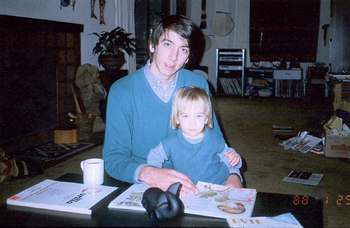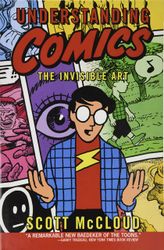Prerelease:The Sims (Windows)/Introduction
This is a sub-page of Prerelease:The Sims (Windows).
Contents
Prologue
| "I went around my house looking at all my objects, asking myself, ‘What’s the least number of motives or needs that would justify all this crap in my house?’ There should be some reason for everything in my house. What’s the reason?" |
The first inklings that Will Wright had for a game like The Sims happened during an extended stay at home, closely coparenting his daughter, Cassidy, with his wife and stay at home artist, Joell Jones[1]. This led him to closely contemplate the usefulness of items in their domestic environment, leading him to envision a new kind of game, a kind of interactive dollhouse that adults would enjoy as much as children.[1]
1991: Materialism's False Promise
| "The wind was coming from the east which was unusual, and there was a lot of smoke. I called 911 and they said everything was under control. It was happening so fast and it was out of control. [...] I started to wonder about all the things we have and how we purchased them for a reason. Why do we need X or Y or Z? Why do we think something will make me happier? |
The unexpected success of the original SimCity — Maxis' first project into a new market of creative simulators — made followup games in a similar vein enticing, leading to the development ofSimAnt and SimEarth.[4] However, SimAnt's development coincided with another major event in Will Wright's life.
His former Oakland house met the same disastrous fate as many other 3800 residences that had been left in ruins by the Oakland-Berkeley Firestorm of 1991, "that occurred on the hillsides of northern Oakland, California, and southeastern Berkeley over the weekend of October 19–20, 1991, before being brought under full control on October 23"[5][6]. Part of Will's belongings that survived the disaster included SimAnt's code and conceptual notebooks, which kept his projects from being permanently lost.[7] The wildfire's wake granted Will Wright several insights on materialism and architecture:
- Towards the Firestorm's end, Wright re-examines the connections between the ownership of goods and happiness. When faced with the wildfire's aftermath, his lost belongings, didn't seem to matter as much as the well-being of those around him[7]
- Following the need to reinvent his life from scratch, Wright gains a new perspective on the logistics of architecture as he would, for instance, engage with brand new items, see the reasons why they were placed at certain areas of his new home, and how they affected the environment as a whole[6]
- And, finally, faced with sudden loss and progressive recovery, Wright concludes that life is essentially a game of constant choices and consequences; a big project in itself. The individual is "too embedded in their day-to-day activities in order to realize it."[2]
Indeed, these realizations formed the foundations of what The Sims became nine years later.
1993-1994:Tactical Domestic Simulator
Ant Antics
| "We decided to program Sim Ant as close to how real ants work as we could, which means that they're actually responding to pheromone trails, and the intelligence is distributed environmentally. We were able to get very complex behavior out of the ants just using these pheromone distributions. So I started to wonder how much of human behavior I could simulate the same way.
The basic engine for The Sims really ends up being one of any pheromones. Every object in the environment is sending out an 'advertisement' of pheromones in a particular flavor. The flavors are the eight basic needs of the Sims. So they can advertise 'food,' 'energy,' 'fun,' 'social,' 'hygiene.' Every object is described in those terms, being the collection of pheromones that it broadcasts. A Sim is always sitting there, smelling all of the pheromones around it saying, 'oh I need to be clean, or I need to be fed' -- whatever -- so they follow that pheromone trail to the closest object that's producing it. The advantage of that -- the whole point of that -- was that we could add new objects into the game later without the Sims having any foreknowledge of what the objects were, as long as they had these pheromones. |
| "I'm hoping to strike out in a slightly different direction. I'm interested in the process and strategies for design. The architect Christopher Alexander, in his book Pattern Language formalized a lot of spatial relationships into a grammar for design. I'd really like to work toward a grammar for complex systems and pre-sent someone with tools for designing complex things. I have in mind a game I want to call Doll House. It gives grown-ups some tools to design what is basically a doll house. But a doll house for adults may not be very marketable." |
Wright's post-disaster life, in the context of creative flow, was filled up with back to back epiphanies. It turned out that, in the environmental chaos that his neighborhood had been put into, the only shape of life that wasn't affected by the firestorm was ants: one of Wright's then-obsessions.[2] One particular aspect in SimAnt that enchanted Wright the most is the virtual insects' ability to engage and obtain more efficient feedback within their world than the human portion of the game, usually colony destroyers; whose artificial intelligence followed predictable conventions, and wasn't nearly as smart and dynamic as the ones that controlled the ants' behavior.[10]This led Wright to consider developing a system that could, with reasonable fidelity, reproduce human behavior in the same fashion as the one that operated the SimAnt's AI[11], and somehow combine it with his increasing interest in architecture.
Most of Wright's inspirations for games come from books[1][12]. Some of the many books that inspired The Sims include:
Time for Life: The Surprising Ways Americans use Their Time, by John Robinson and Geoffrey Godby (1997)[13]
Understanding Comics, by Scott McCloud (1993)[14]
Motivation and Personality, by Abraham Maslow (1954)[15]
The Toilet Game
| "The board looked at The Sims and said, ‘What is this? He wants to do an interactive doll house? The guy is out of his mind." |
| "The Sims was not heralded during the development as the messiah, oh-my-god-this-is-the-second-coming. It was like, shoot this thing dead, it's never going to get done, who's going to want to play this? Who wants to tell people to go to the bathroom?" |
| "When I joined The Sims I was like, it was going to be a game about toilets, okay, cool." |
| "[...] it was not-very-affectionately-known within the company as "the toilet game." Will Wright had tremendous stamina for the risk involved with trying something very new, but there were certainly a lot of head-scratchers both on the team and outside of it." |
| "[...] I was basically trying to get people inside of Maxis enthused about the idea and that's where the battle was. Those people wanted to keep doing SimCity, and they didn't think The Sims made sense. So I was fighting just the internal structure of Maxis... which is the company I'd started! The game was just so mundane they couldn't imagine -- they could kind of see that you'd want to build this city and have these grandiose towers, but why you'd want to go clean the toilet and answer the front door didn't make sense. To be fair at the time nobody had-- well, in my mind I had a sense of what we could do with the behavioral engine, but up to that point there had been no example in games of anything but scripted simple behavior. So I don't think people understood how robust a range of situations that this game could simulate.
I don't think they had an existing model in their head for what this game could do. Usually people look at games and say "oh yeah really good graphics like Half-life" or "engaging gameplay like Civilization" or they have some model in their head where "its like this." But when you don't have a template to judge it against, its really hard to get somebody to share your vision. When you have all these little moving parts in your head (where 'this is going to do that' and 'this thing's connected to that' and 'it's gonna end up like this thing' and it's really cool), its easy for one person like a designer to build a model in their head, in their imagination. But how these things are all going to come together and create a compelling experience, its very hard to download that imaginary model to somebody else to where they can basically play the game in their head and see the game years down the road. |

Finally, sometime in '93, with the to-do list cleared and time for new Sim titles to be brought to life, Wright decided to go one step further, trying to persuade his colleagues at Maxis about his long held dream of engineering a virtual doll house, going by the temporary title Home Tactics, also known as Tactical Domestic Simulator — TDS for short.[21]). However, not even the creative-minded Maxis could predict the popularity of the game.
The lack of interest nearly killed the game, and was seen as the weakest of the four concepts pitched at that time. No one could see either escapism or value in doing the same chores in game as they do already at home, and Maxis couldn't even tell who the target audience for the game was.
| "[Laughs] Actually in the very first prototype I made in '93, that was the one object I had in the game. You could build walls, you could move little guys around, you had terrain, and there was a toilet. That was the only object interaction [...] it was actually an interesting object to me because it had so many different interactions with it. You know, you could clean the toilet, you could use the toilet..." |
In no time, Home Tactics was given a not-so-whimsical name by the Maxis executivesː The Toilet Game; a single toilet was the first object ever fully developed for the game[17][18][23], justified by the multiple ways it can be interacted with (one can use it, clean it, unclog it...), making it a low-effort behavioral laboratory[6].
| "I put [The Sims] down for a few years while I was doing SimCity 2000 and Sim Copter. I picked it back up and it was still pretty low level, and that's when it was kind of very hard to sell everyone else on the idea." |
Conceding his cause lost for the moment, Wright went to work on Sim City 2000. He intended to pursue The Sims development in his free-time, with limited resources.[7]. Thankfully, everything would be accomplished with flying colors, as soon as the right people made it to the partyǃ
References
- ↑ 1.0 1.1 1.2 1.3 1.4 1.5 Game Master - The New Yorker, November 6, 2006
- ↑ 2.0 2.1 2.2 Will Wright: Inspired to make The Sims after losing a home Berkleyside, Oct. 17th, 2011
- ↑ The Sims Online - Geoff Keighley: Behind The Games: The Endless Hours of The Sims Online (Page 13, 2002) - GameSpot.com, 2002
- ↑ :: Will-Wright Fansite :: History, Page 6 - Will Wright Fansite, ca. May, 2005
- ↑ Oakland Firestorm of 1991 - Wikipedia, Oct. 7th, 2021
- ↑ 6.0 6.1 6.2 6.3 :: Will-Wright Fansite :: History, Page 7 - Will Wright Fansite, ca. May 2005
- ↑ 7.0 7.1 7.2 A Brief History of 'The Sims' | Mental Floss - Mental Floss, Jun. 3rd, 2021
- ↑ Will Wright: The Mayor of SimCity WIRED, 1994
- ↑ Will Wright explains what The Sims and an ant colony have in common - engadget, November 9, 2010
- ↑ From Ant to City and Beyond: A History of All Things Sim - Mental Floss, January 30, 2013
- ↑ 11.0 11.1 Making Of: The Sims | Rock Paper Shotgun Rock Paper Shotgun, Jan. 18th, 2008
- ↑ Will Wright - The Colbert Report (Video Clip) | Comedy Central US As said by Will Wright on The Colbert Report's Dec. 4th, 2006 Episode
- ↑ Will Wright: Inspired to make The Sims after losing a home Berkleyside, Oct. 17th, 2011
- ↑ The world according to Will - Salon.com Salon, Feb. 17th, 2000
- ↑ [1] The Sims 3: Ambitions Commemorative Edition, ca. May/June 2010
- ↑ Guys and Digital Dolls: The Washington Post, April 14, 2002
- ↑ 17.0 17.1 Chris Trottier (Sims Online) Q&A, February 27, 2003
- ↑ 18.0 18.1 Meet Chris Trottier: The Invisible Design Hand At Zynga: Insider, July 12, 2012
- ↑ "Will Wright Speaks Simlish" 2/8 - GameSpy, Feb. 27, 2005
- ↑ The Sims Online - Geoff Keighley: Behind The Games: The Endless Hours of The Sims Online (Page 1, 2002) - GameSpot.com, 2002
- ↑ Designing User Interfaces to Simulation Games, Don Hopkins (January 12nd, 2004)
- ↑ "Will Wright Speaks Simlish" 3/8 - GameSpy, Feb. 27, 2005
- ↑ Dust or Magic 2009: Jeff Braun on the early days of Maxis, Will Wright and SimCity - Jeff Braun, 2010
- ↑ "Will Wright Speaks Simlish" 1/8 - GameSpy, Feb. 27, 2005




